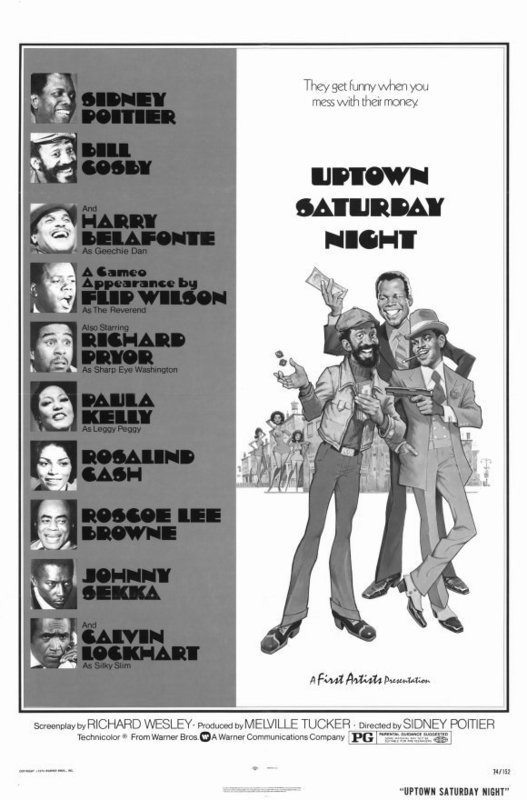Uptown Saturday Night (1974)
Dublin Core
Title
Uptown Saturday Night (1974)
Description
Warner Bros., a prominent Hollywood production company, shaped how Uptown Saturday Night interacted with a mass, mostly white, audience, and therefore limited the movie’s ability to explore the racial themes and issues seen in other mostly black films of the time. For this reason the urban landscape that Cosby and Poitier encounter is much different than the Blaxploitation films of the same period. As the two friends scour the city, they run into conmen, crooks, and a phony congressman. In the promotional materials, three smiling and jubilant black men stand in the forefront of the image, seemingly joking around and enjoying each other’s company. One holds a gun, but in a more gestural manner rather than a threatening or violent one. These men have inviting faces, which are drawn much lighter than all of their actually skins tones, that speak to the comedic nature of the film and entice the viewer to go and see it. The only mention of the underbelly and urban landscape seen in the film are the small buildings and scantily clad women standing in the background. Almost unnoticeable, these women and buildings suggest a connection to the urban, racy and action packed part of the film. Their location, far behind the main figures, speaks to the distance that the stars feel from that part of society.
Cosby and Poitier’s appearance on the poster mimic how they appear throughout the film. Their demeanors and reactions to the world in the urban landscape is constantly comedic and lighthearted, suggesting that two stars interact with these people very differently than many of the black films of the time. Instead of directly engaging with the subject of black urban issues, Cosby and Poitier remove themselves from that world and appear as outsiders.
Poitier and Cosby seem very mild mannered and funny, thus making them non-threatening to white audiences. Christine Acham, in her book Revolution Televised, states that Bill Cosby is “a black person that white people would accept into their homes” (144-5). In addition, Ed Gurrero argues that Sydney Poitier’s work in this movie and others was muted and one-dimensional, lacking the accurate black representations many audiences yearned for. He explains that Poitier’s roles were thought to be “laughably out of touch with the rising demand for assertive, realistic black images on the screen” (76). Warner Bros. recognized both Poitier and Cosby as safe choices that would aid their ultimate goal of appealing to a wide and white audience and used them to their advantage when making the film.
Guerrero, Ed, Framing Blackness: the African American Image in Film, Temple University Press, 1993.
Wesley, Richard, Uptown Saturday Night, Warner Bros. Entertainment, 1974.
Cosby and Poitier’s appearance on the poster mimic how they appear throughout the film. Their demeanors and reactions to the world in the urban landscape is constantly comedic and lighthearted, suggesting that two stars interact with these people very differently than many of the black films of the time. Instead of directly engaging with the subject of black urban issues, Cosby and Poitier remove themselves from that world and appear as outsiders.
Poitier and Cosby seem very mild mannered and funny, thus making them non-threatening to white audiences. Christine Acham, in her book Revolution Televised, states that Bill Cosby is “a black person that white people would accept into their homes” (144-5). In addition, Ed Gurrero argues that Sydney Poitier’s work in this movie and others was muted and one-dimensional, lacking the accurate black representations many audiences yearned for. He explains that Poitier’s roles were thought to be “laughably out of touch with the rising demand for assertive, realistic black images on the screen” (76). Warner Bros. recognized both Poitier and Cosby as safe choices that would aid their ultimate goal of appealing to a wide and white audience and used them to their advantage when making the film.
Guerrero, Ed, Framing Blackness: the African American Image in Film, Temple University Press, 1993.
Wesley, Richard, Uptown Saturday Night, Warner Bros. Entertainment, 1974.
Citation
“Uptown Saturday Night (1974),” WUSTL Digital Gateway Image Collections & Exhibitions, accessed July 16, 2024, http://omeka.wustl.edu/omeka/items/show/14334.
